

Navigating the cancer diagnosis of your feline friend can be a challenging time filled with worry and uncertainty. Even with the close help of your veterinarian, you may be concerned about how effectively the medications and treatments affect your cat. Some of the most common treatments, such as surgery, radiation, and chemotherapy, are known to help in some cases. Still, these procedures can be highly invasive and uncomfortable for your cat and may have unwanted side effects like infections, vomiting, and decreased appetite. Chemo can decrease immunity by harming healthy cells and lead to infections and inflammation.
Depending on your cat’s cancer stage and what kind of cancer it is, medicinal mushrooms can be a great addition to your cat’s cancer treatment. Fortunately, there are many medicinal mushrooms that are backed by studies to have several health benefits, including immune support, anti-tumor properties, and support for your cat’s overall quality of life.
Best types of mushrooms for cats with cancer
Shiitake
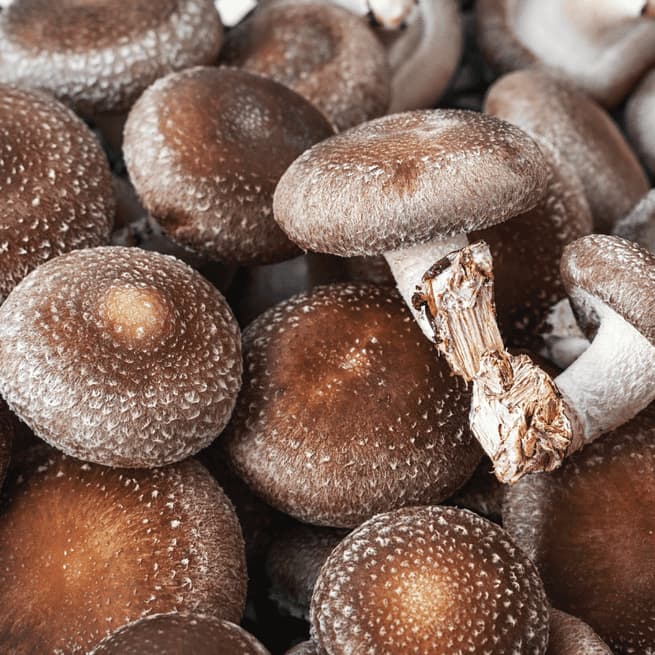
You may have heard of shiitake mushrooms (Lentinula edodes) for their popularity in many food dishes, but did you know that shiitakes are also a potent medicinal mushroom? Shiitakes are high in tryptophan and arginine, which are amino acids that enhance the body’s natural immunity defenses, allowing it to effectively kill cancer cells. Furthermore, shiitake has high amounts of beta-glucan polysaccharides, like lentinan, found in its mycelium. Lentinan has been found to have cancer-preventing and anti-tumor properties in several studies.
In one human analysis, scientists researched how the bioactive chemicals in shiitake interacted with breast cancer cells and myeloma cells. The study results suggest that the tumor cells were inhibited from growing or spreading following treatment (1).
Another study, done on mice with sarcoma, tested to see how isolated extracts of lentinan reacted with cancer cells in live animals. Researchers concluded that the lentinan preparation inhibited the growth of the sarcoma cells with almost complete tumor regression (2).
Shiitake mushrooms are safe for cats to eat. And, even though there have been no major studies testing the effectiveness of shiitake mushrooms on cat cancer cells, these two trials in humans and mice have demonstrated the efficacy of the mushroom and its lack of side effects in both humans and animals.
Cordyceps
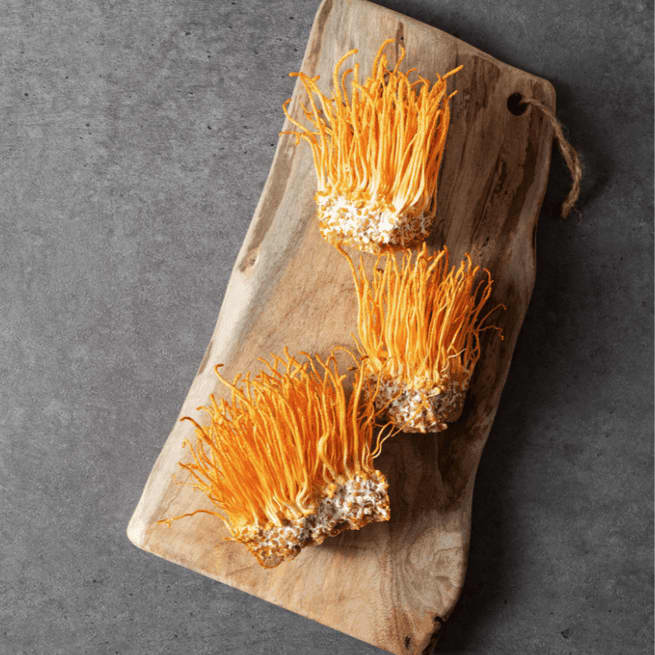
Cordyceps is a medicinal mushroom that’s safe and incredibly beneficial to cats. An anti-fungal protein found in cordyceps was shown to kill cancer cells and has been isolated as an anti-cancer drug (3).
When your cat is fighting off cancer and going through chemotherapy, they may experience a loss of white blood cells since chemo can attack healthy cells along with the cancer cells. White blood cells help the body fight off diseases and infections, so a low count can be detrimental to your cat’s recovery. Cordyceps helps fight cancer by boosting the production of T cells, a type of white blood cell responsible for helping the body fend off foreign invaders like cancer cells (4).
Finally, your cat may experience low energy levels while fighting off cancer and going through treatment. Cordyceps is known to enhance energy on a cellular level through ATP (adenosine triphosphate), an organic compound that carries and fuels energy to living cells throughout the body (5). If your cat has more energy, you can enjoy more time with them being themselves rather than hiding away, lethargic with not enough capacity to socialize and play.
Reishi
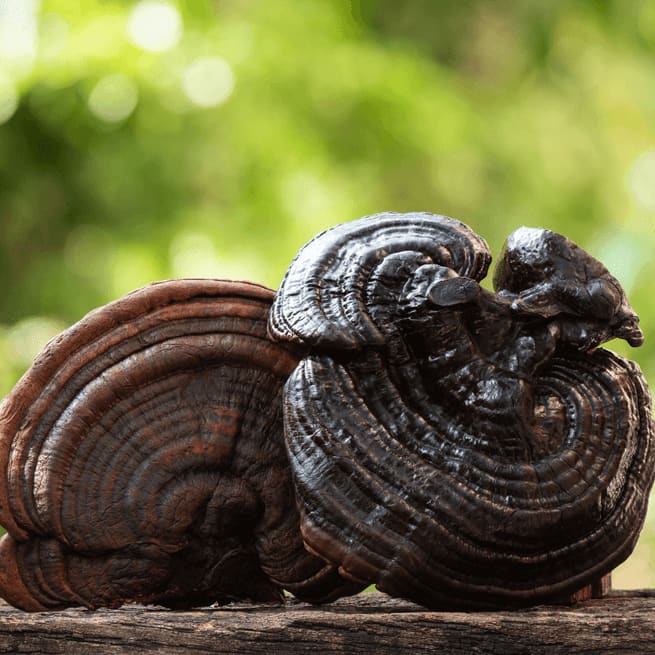
Reishi (Ganoderma lucidum) has been historically used in traditional Chinese medicine to support the immune system. It is one of the most common holistic cancer treatments as it has several trials demonstrating its cancer-fighting and immune-boosting properties. Reishi is currently used in Japan and China as an adjunct therapy to traditional anti-cancer drugs. Reishi mushrooms are high in triterpenoids and polysaccharides, strengthening immune health and killing cancer cells. Several preclinical trials in humans have shown that reishi has promising immunomodulatory properties. Participants who consume reishi saw a significant reduction in cancer growth and an improvement in their symptoms (6).
Reishi is also considered an adaptogen, which helps the body react and adjust to stress, anxiety, and fatigue. Going through cancer and undergoing treatment can be incredibly stressful for your cat. Using an adaptogen like reishi can help boost their mood and energy levels while helping them feel more relaxed.
Turkey tail
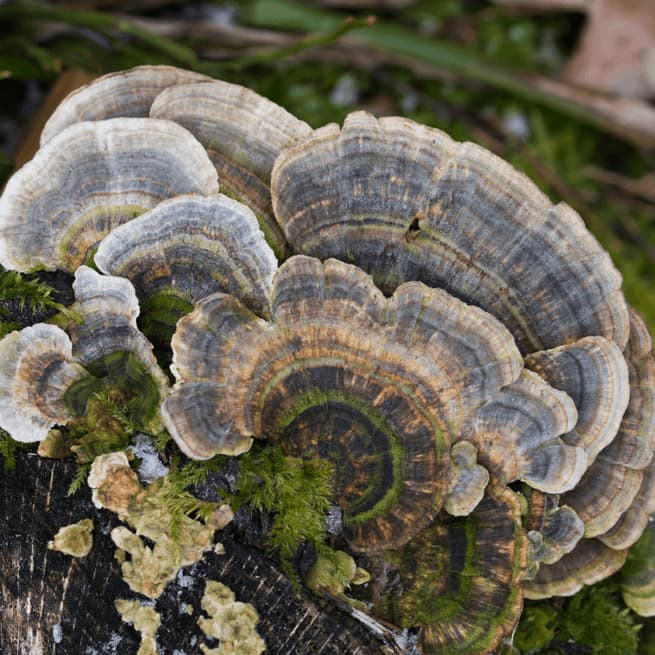
The turkey tail mushroom is one of the most researched medicinal mushrooms out there due to its promise as a potent anti-cancer medicine. Also used in Japan and China as an adjunct therapy for cancer patients, turkey tail has shown several instances of efficacy in treating cancer. Turkey tail has proven to be so effective that the U.S. Food and Drug Administration (FDA) has approved several clinical trials for cancer patients to use the fungal extract in combination with chemotherapy. One of the best-known compounds in turkey tail is Polysaccharide K (PSK) and Polysaccharide Peptide (PSP), which have been isolated and used in studies for their ability to promote immunomodulatory effects and fight against tumor growth (7).
In a randomized, double-blind study, researchers tested the benefits of PSP on canines with hemangiosarcoma. This highly metastatic skin cancer more often affects cats with lighter skin or hair. The study found that the high-dose PSP treatment significantly delayed the advancement of malignant growths and increased the survival time of the test subjects (8).
Moreover, turkey tail is packed with antioxidant compounds that fight against free radicals and oxidative stress. Free radicals are highly reactive and can harm cells and damage DNA, which can lead to diseases like cancer. Several studies have shown that antioxidants help prevent the free radicals linked to cancer development. And according to one scientific review, using antioxidants during chemotherapy can reduce chemotherapeutic-induced toxicity and promote “higher therapeutic efficiency and increased survival times in patients” (9).
Maitake
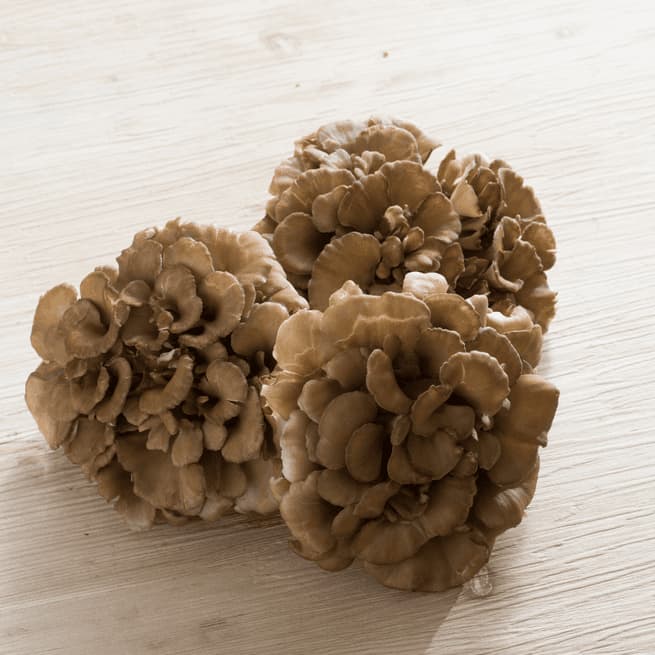
Maitake (Grifola frondosa) is a superfood and edible mushroom known for its rich flavor and countless health benefits. One major way maitake mushrooms help fight cancer in cats is through their high amounts of beta-glucans which have anti-inflammatory properties. Inflammation is a serious factor in tumor progression, and many cancers can arise from sites of chronic inflammation (10). Inflammatory cells allow tumors to thrive, so anti-inflammatory compounds like beta-glucans can help reduce these cells and slow down tumor development (11).
One notable beta-glucan in Maitake is D-Fraction, an active polysaccharide compound extracted from the mushroom and used in several cancer studies. D-Fraction has antitumor effects by enhancing the immune system. In one human study, researchers found that the extracted D-Fraction activated the stimulation of natural killer (NK) cells which target aberrant cells like cancer. D-Fraction reduced the progress of metastatic cells and tumor growth while increasing NK cell activity in all treated patients (12). The compound has also shown efficacy as an adjunct therapy to chemo with much success at repressing cancer progression, demonstrating the promising benefits of supplementing your cat with maitake along with their traditional treatment.
Chaga
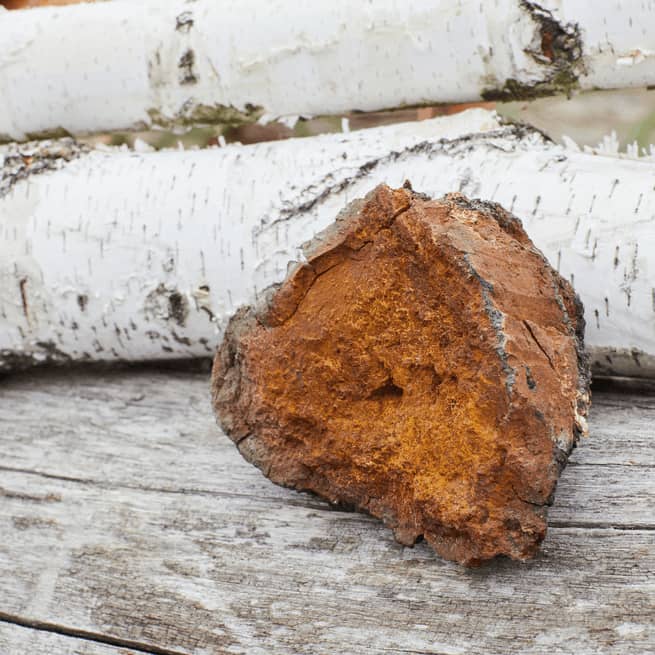
Chaga (Inonotus obliquus) has many of the same anticancer properties as the other mushrooms mentioned on this list — it is rich in beta-glucans and triterpenoids while chock full of antioxidants. In fact, chaga has one of the highest antioxidant levels of any naturally occurring food, and, as previously mentioned, antioxidants can help prevent cancer development and progression. Chaga also contains a triterpenoid called lanostane which activates T cells, therefore improving immunity (13).
Additionally, many studies have found that chaga can successfully kill cancer cells and reduce tumor sizes. In one animal study, mice with tumors saw a 60% reduction in tumor sizes after being treated with chaga extract (14). Another study, tested on human cancer cells, found that chaga inhibits cancer cell growth and kills these cells, suggesting that the mushroom could be a potential therapeutic option due to its anticancer effects (15). Overall, chaga is a viable treatment option for cats with cancer, whether they’re undergoing chemotherapy or not.
Mushroom supplements for cats with cancer
Mushroom dietary supplements are the easiest way to get medicinal mushrooms into your pet’s diet. There are many different types of mushroom supplements, from mushroom extracts to mushroom blend powders. Here are some of the top mushroom supplements that are formulated for cats with cancer:
Bark & Whiskers Fermented Mushroom Blend
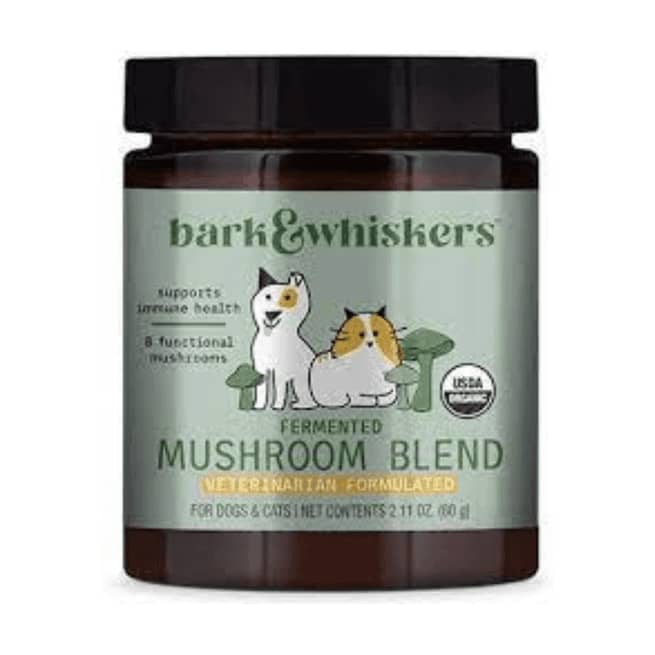
This mushroom blend is formulated with both the fruiting bodies and mycelium of eight different functional mushrooms. It is 100% organic and biologically active, perfect for immune and digestive support.
Nature’s Immuno For Cats
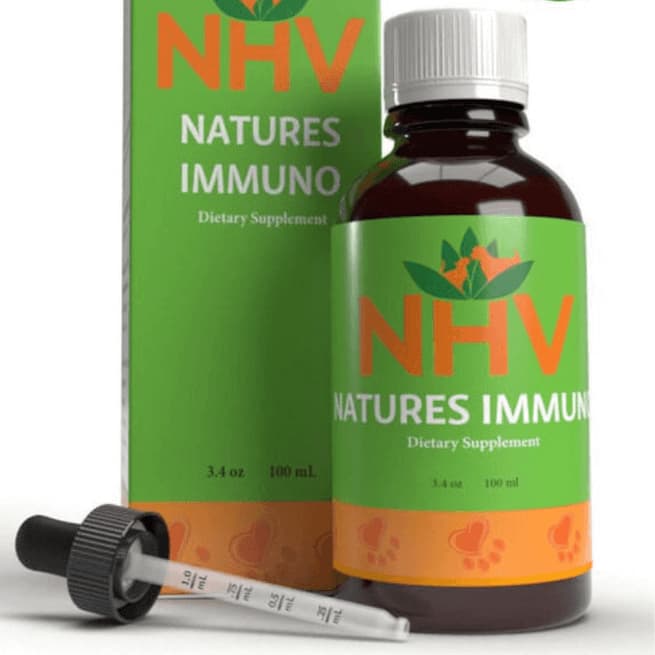
Formulated with turkey tail, cordyceps, shiitake, and agaricus mushrooms, this vet-formulated tincture blend can help support your cat’s immune function. The liquid form increases the bioavailability of the mushrooms so that the tincture is absorbed at a faster rate. It works great for cats already going through chemotherapy.
Mushroom Immune Gold - Holistic Cancer Support for Cats
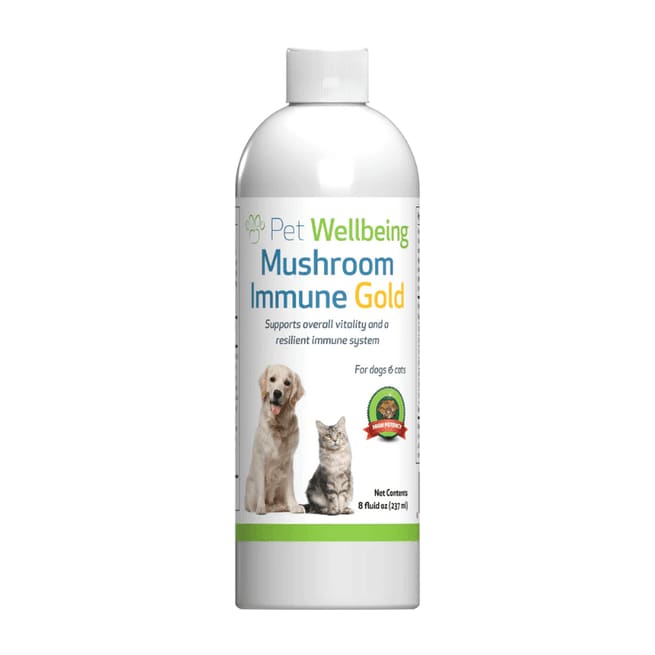
Mushroom Immune Gold is a highly potent blend of medicinal mushrooms and herbs such as turkey tail, reishi, maitake, and milk thistle. This veterinarian-researched formula is certified organic and full spectrum, containing both the mycelia and fruiting body of the mushrooms for optimal results in treating cat cancer and boosting immunity.
VetSmart Critical Immune Defense
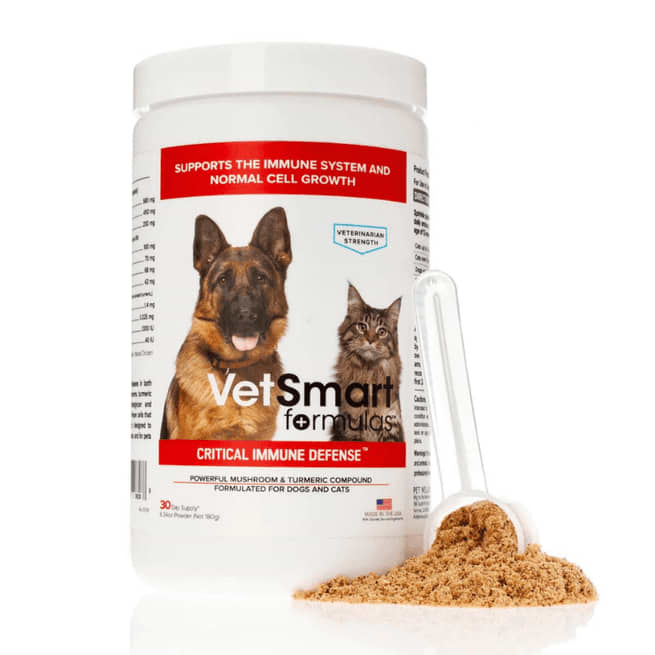
This powdered supplement is carefully formulated with a blend of maitake, shiitake, reishi, turkey tail, and other science-backed active ingredients to help fight off cancer and increase overall immunity. It can be safely used with prescription drugs, steroids, and chemo treatments.
You can also treat your cat with dual extract tinctures of single mushrooms instead of opting for a blend. Just be sure to give the correct dosage to your cat, as they will require less than the recommended human dosage. You can treat your cat to 10-25 mg per pound daily for each mushroom on this list.
Give medicinal mushrooms a shot
A cancer diagnosis is every pet parent’s worst nightmare, as one in five cats will develop cancer in their lifetime. Fortunately, if caught early on, many cancers are treatable. With the help of veterinary medicine and holistic methods like medicinal mushrooms, your furry friend can stand a fighting chance against cancer and have relief against many of the adverse effects it may cause. If your cat is undergoing chemotherapy right now, it’s worth a shot to use medicinal mushrooms since several scientific studies have shown that they can enhance treatment and reduce any negative side effects.
References
- Fang, Nianbai, Qinglin Li, Shanggong Yu, Jianxiang Zhang, Ling He, Martin J. J. Ronis, and Thomas M. Badger. 2006. “Inhibition of Growth and Induction of Apoptosis in Human Cancer Cell Lines by an Ethyl Acetate Fraction from Shiitake Mushrooms.” Journal of Alternative and Complementary Medicine (New York, N.Y.) 12 (2): 125–32. https://doi.org/10.1089/acm.2006.12.125.
- Chihara, Goro, Junji Hamuro, Yukiko Y Maeda, Yoshiko Arai, and Fumiko Fukuoka. 1970. “Fractionation and Purification of the Polysaccharides with Marked Antitumor Activity, Especially Lentinan, from Lentinus Edodes (Berk.) Sing. (an Edible Mushroom)1.” Cancer Research 30 (11): 2776–81. https://aacrjournals.org/cancerres/article/30/11/2776/477919/Fractionation-and-Purification-of-the.
- Park, Byung Tae, Kwang Heum Na, Eui Cha Jung, Jae Wan Park, and Ha Hyung Kim. 2009. “Antifungal and Anticancer Activities of a Protein from the Mushroom Cordyceps Militaris.” The Korean Journal of Physiology and Pharmacology 13 (1): 49. https://doi.org/10.4196/kjpp.2009.13.1.49.
- Yan, Ping, Qi-Yang Shou, and Hui-Ying Fu. 2020. “Applications of Cordyceps Sinensis in Cancer.” Www.heraldopenaccess.us. July 6, 2020. https://doi.org/10.24966/ACIM-7562/100108
- Tuli, Hardeep S., Sardul S. Sandhu, and A. K. Sharma. 2013. “Pharmacological and Therapeutic Potential of Cordyceps with Special Reference to Cordycepin.” 3 Biotech 4 (1): 1–12. https://doi.org/10.1007/s13205-013-0121-9.
- Jeitler, Michael, Andreas Michalsen, Daniela Frings, Marisa Hübner, Moritz Fischer, Daniela A. Koppold-Liebscher, Vijay Murthy, and Christian S. Kessler. 2020. “Significance of Medicinal Mushrooms in Integrative Oncology: A Narrative Review.” Frontiers in Pharmacology 11 (November). https://doi.org/10.3389/fphar.2020.580656.
- Saleh, Mohammad H., Iran Rashedi, and Armand Keating. 2017. “Immunomodulatory Properties of Coriolus Versicolor: The Role of Polysaccharopeptide.” Frontiers in Immunology 8 (September). https://doi.org/10.3389/fimmu.2017.01087.
- Brown, Dorothy Cimino, and Jennifer Reetz. 2012. “Single Agent Polysaccharopeptide Delays Metastases and Improves Survival in Naturally Occurring Hemangiosarcoma.” Evidence-Based Complementary and Alternative Medicine : ECAM 2012. https://doi.org/10.1155/2012/384301.
- Singh, Kanchanlata, Mustansir Bhori, Yasar Arfat Kasu, Ganapathi Bhat, and Thankamani Marar. 2018. “Antioxidants as Precision Weapons in War against Cancer Chemotherapy Induced Toxicity – Exploring the Armoury of Obscurity.” Saudi Pharmaceutical Journal : SPJ 26 (2): 177–90. https://doi.org/10.1016/j.jsps.2017.12.013.
- Coussens, Lisa M., and Zena Werb. 2002. “Inflammation and Cancer.” Nature 420 (6917): 860–67. https://doi.org/10.1038/nature01322.
- Su, Chun-Han, Mei-Kuang Lu, Ting-Jang Lu, Ming-Nan Lai, and Lean-Teik Ng. 2020. “A (1→6)-Branched (1→4)-β-D-Glucan from Grifola Frondosa Inhibits Lipopolysaccharide-Induced Cytokine Production in RAW264.7 Macrophages by Binding to TLR2 rather than Dectin-1 or CR3 Receptors.” Journal of Natural Products 83 (2): 231–42. https://doi.org/10.1021/acs.jnatprod.9b00584.
- Kodama, Noriko, Kiyoshi Komuta, and Hiroaki Nanba. 2003. “Effect of Maitake (Grifola Frondosa) D-Fraction on the Activation of NK Cells in Cancer Patients.” Journal of Medicinal Food 6 (4): 371–77. https://doi.org/10.1089/109662003772519949.
- Maza, Perry Ayn Mayson A., Ji-Hyun Lee, Yong-Su Kim, Gyu-Min Sun, Youn-Joo Sung, Ludmila P. Ponomarenko, Valentine A. Stonik, Minsook Ryu, and Jong-Young Kwak. 2021. “Inotodiol from Inonotus Obliquus Chaga Mushroom Induces Atypical Maturation in Dendritic Cells.” Frontiers in Immunology 12 (March). https://doi.org/10.3389/fimmu.2021.650841.
- Arata, Satoru, Jun Watanabe, Masako Maeda, Masato Yamamoto, Hideto Matsuhashi, Mamiko Mochizuki, Nobuyuki Kagami, Kazuho Honda, and Masahiro Inagaki. 2016. “Continuous Intake of the Chaga Mushroom (Inonotus Obliquus) Aqueous Extract Suppresses Cancer Progression and Maintains Body Temperature in Mice.” Heliyon 2 (5): e00111. https://doi.org/10.1016/j.heliyon.2016.e00111.
- Youn, Myung-Ja, Jin-Kyung Kim, Seong-Yeol Park, Yunha Kim, Se-Jin Kim, Jin Seok Lee, Kyu Yun Chai, et al. 2008. “Chaga Mushroom (Inonotus Obliquus ) Induces G0/G1 Arrest and Apoptosis in Human Hepatoma HepG2 Cells.” World Journal of Gastroenterology 14 (4): 511. https://doi.org/10.3748/wjg.14.511.


